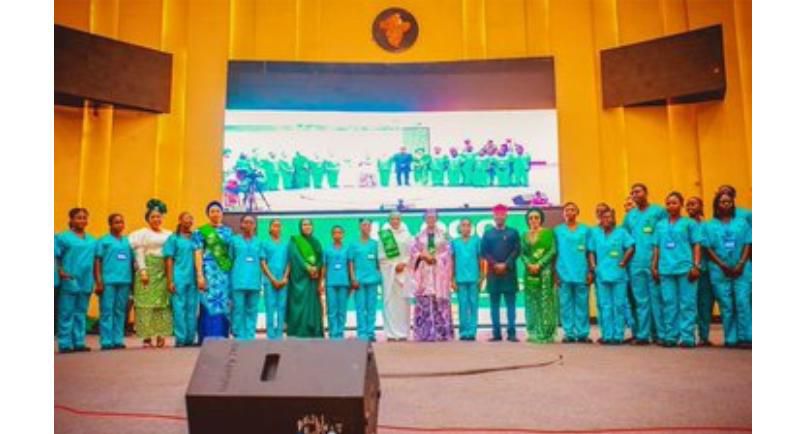The Federal Government has reaffirmed its commitment to improving maternal and child health in Nigeria, with a targeted goal of reducing the maternal mortality rate by 20% and the under-five mortality rate by 15% by the year 2027.
This was disclosed by the Minister of State for Health and Social Welfare, Dr. Iziaq Salako, during a ceremony in Enugu State where 10,000 professional kits were distributed to midwives. The event, held at the International Conference Centre, Enugu, was part of an ongoing initiative spearheaded by the First Lady, Senator Oluremi Tinubu.
Dr. Salako emphasised that the distribution of professional kits is a strategic effort to empower and motivate frontline health workers, especially nurses and midwives, who play a critical role in reducing maternal and infant deaths. According to him, the initiative is aligned with President Bola Tinubu’s broader health agenda.
“This effort is to create a large pool of motivated and empowered professionals who can deliver on the president’s vision of reducing maternal and under-five mortality by 2027,” he said.
In her remarks, the First Lady of Nigeria, Oluremi Tinubu, stated that the initiative falls under the Renewed Hope Initiative (RHI), which aims to bolster maternal and child health services and support frontline healthcare workers nationwide.
Senator Tinubu revealed that 10,000 kits containing scrubs and Crocs were being distributed to midwives in the Southeast region, as part of a nationwide plan to provide 60,000 kits to health professionals.
“Since January 2024, we’ve distributed 50,000 kits across five geopolitical zones. I’m pleased that we are concluding this phase with the Southeast,” she noted.
She also highlighted that the project has received backing from international partners engaged during global forums such as the 2023 United Nations General Assembly and the 2024 African Union Summit.
The initiative underscores the Federal Government’s renewed focus on strengthening Nigeria’s healthcare system and reducing preventable deaths among women and children.
Other Initiatives
Nigeria’s First Lady also announced the launch of the “Free to Shine Triple Elimination Campaign”, an ambitious initiative aimed at eradicating mother-to-child transmission of HIV, syphilis, and hepatitis.
The campaign is set to officially commence in Enugu as part of the broader Renewed Hope Initiative (RHI), a flagship program focused on strengthening maternal and child health.
Speaking at an event in Enugu where 10,000 professional kits were distributed to midwives in the Southeast region, Mrs Tinubu emphasised that the new campaign marks another milestone in the government’s ongoing effort to curb maternal and infant mortality in Nigeria.
Beyond the health sector, the First Lady also unveiled a major economic empowerment package for petty traders in Enugu State. She announced that ₦50 million will be disbursed as grants to 1,000 local traders while an additional ₦50 million, donated by the Tony Elumelu Foundation, will benefit another 500 traders.
Mrs Tinubu, accompanied by the wife of the Vice President, Hajiya Nana Shettima, and several wives of state governors, also highlighted the scale of the RHI’s health workforce training program.
She noted that 60,000 frontline health workers have already been trained through the initiative, complementing the Federal Government’s target to retrain 120,000 medical personnel.
Speaking at the event, Mrs Nkechinyere Mbah, the wife of the Enugu State Governor, underscored the pivotal role of midwives in maternal and child healthcare systems. She cited global studies showing that a well-supported midwifery workforce can prevent up to 41% of maternal deaths, 39% of neonatal deaths, and 26% of stillbirths.
Governor Peter Mbah of Enugu State also lauded the Federal Government for its efforts to revamp primary healthcare infrastructure across the country.
He stated that Enugu had effectively utilised these federal initiatives to bolster healthcare services at the community level.
“We sincerely appreciate the impactful role that midwives are playing in delivering on the maternal and child health agenda of the president,” Governor Mbah said. “I want to salute our frontline midwives who guide our women through safe pregnancies and healthy deliveries.”
He assured continued government support for healthcare workers, pledging the provision of essential tools, welfare packages, and conducive working conditions.
“The kits being distributed today symbolise our collective commitment to preserving life and upholding the dignity of our women and children. I urge all beneficiaries to use these kits responsibly and with the professionalism that this noble calling demands,” Mbah added
The event marked the final leg of a nationwide tour that has seen 60,000 professional kits distributed to frontline health workers across Nigeria’s six geopolitical zones.
Statistics on maternal mortality crises in Nigeria
Maternal and child mortality continues to pose a major public health challenge in Nigeria, with the country contributing significantly to global death rates, according to recent international reports.
A 2024 World Bank report reveals that Nigeria accounts for 20% of the global burden of maternal deaths, underscoring the scale of the crisis. With a maternal mortality rate of 576 deaths per 100,000 live births, Nigeria now ranks fourth highest in the world in terms of maternal mortality.
Similarly, a report by the United Nations Children’s Fund (UNICEF) highlights the stark disparity between Nigeria’s population size and its share of maternal deaths. Although Nigeria comprises only 2.4% of the global population, it is responsible for 10% of all maternal deaths worldwide.
The UNICEF report also paints a grim picture of child survival in the country. Each year, approximately 262,000 newborns die at birth in Nigeria as the second-highest total globally. The country’s infant mortality rate stands at 69 per 1,000 live births, while the under-five mortality rate is 128 per 1,000 live births.
These figures reflect deep-rooted challenges in Nigeria’s healthcare system, particularly in maternal, newborn, and child health services. Despite ongoing efforts by the government and partners to address these issues, the data underscores the urgent need for intensified action to improve access to quality care, especially in underserved and rural areas.
Read also: Ondo, FG partner to reduce maternal, neonatal mortality by 30% in 2027



